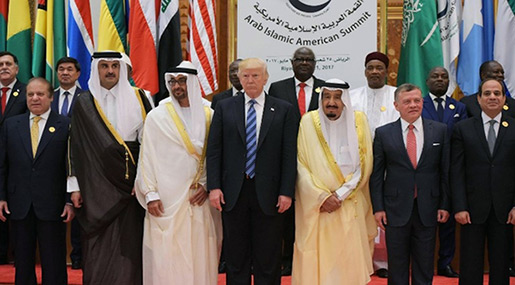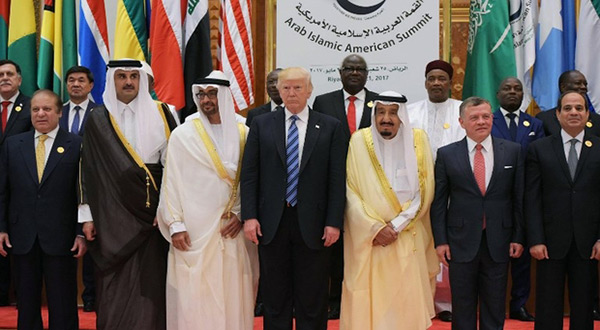
The Secret Yacht Summit That Realigned the Middle East

David Hearst
George Nader, the Lebanese-American businessman and convicted pedophile, who is co-operating with special counsel Robert Mueller's investigation into Donald Trump's campaign funding, organized a secret summit of Arab leaders on a yacht in the Red Sea in late 2015, Middle East Eye can reveal.

Nader proposed to the leaders gathered on the yacht that they should set up an elite regional group of six countries, which would supplant both the Gulf Cooperation Council (GCC) and the moribund Arab League.
Nader said this group of states could become a force in the region "that the US government could depend on" to counter the influence of Turkey and Iran, according to two sources briefed on the meeting.
Nader brought together Mohammed bin Salman, who was then deputy crown prince of Saudi Arabia; Mohammed bin Zayed, crown prince of Abu Dhabi; Abdel Fattah al-Sisi, president of Egypt; Prince Salman, crown prince of Bahrain; and King Abdullah of Jordan onto the yacht.
Their respective states, plus Libya which was not represented at the secret summit, would form the nucleus of pro-US and pro-"Israeli" states.
Nader is reported to have told the leaders: "If you agree to this, I will lobby for this in Washington," two sources with knowledge of the meeting told MEE. Those who attended liked the idea.
How Trump was key to plans
The secret summit on the Red Sea took place towards the end of King Salman's first year in power, when his son MBS was only deputy crown prince.
His chief obstacle to the Saudi throne lay in the form of his elder cousin Mohammed bin Nayef, who was crown prince and a favorite of Washington's security establishment. MBS would become crown prince in June 2017, only after his father deposed Bin Nayef.
Trump had only announced his candidacy months before in June 2015 when the Democratic nominee Hillary Clinton was leading in all the polls. She was thought by the Saudis and Emiratis to be more likely to ring fence the nuclear deal Barack Obama made with Iran, and to be generally more skeptical of their plans for a push back in the region.
Significantly, these Arab leaders decided in late 2015 that a wildcard presidential candidate in the shape of Trump could be the key to their plans to become the new regional hegemons.
Months later, in January 2016, King Abdullah of Jordan briefed US Congressional leaders that Turkey presented the main threat to regional security.
As MEE reported, the king told US congressmen in a closed meeting that Turkey exported terrorists to Europe, comments he was to deny publicly later.
But Jordan then fell out dramatically with the group which had gathered on the yacht: Saudi Arabia decided that Amman did not go far enough in enforcing the blockade against Qatar, which was imposed in June last year.
The split between Saudi and Jordan widened further when Jordan voted against Trump's move to recognize Jerusalem as the capital of Israel, which threatens Jordan's role as custodian of the Holy Places in the city.
Nader the go-between
Nader has recently emerged as a key back channel between Bin Zayed and Trump. The New York Times has reported that Mueller is actively chasing financial links in order to establish whether the Emiratis illegally contributed funds to Trump's presidential campaign.
It reported that in recent weeks Mueller's investigators have questioned Nader and pressed witnesses about any possible attempts by the Emiratis to buy political influence by directing money to Trump's presidential campaign.
Despite this criminal history, Nader was actively used by Trump. He attended a meeting with Jared Kushner, Trump's son-in-law, and Steve Bannon, his chief political strategists at Trump Tower in New York in December 2016.
A month later Nader, Erik Prince, the former head of Blackwater, and a Russian banker all attended a meeting in the Seychelles with Bin Zayed.
Nader has long-standing connections with "Israel". During the presidential elections bin Zayed sent Nader to meet "Israeli" officials to discuss how the two states can co-operate, a source told MEE. Nader established ties with "Israel" through an American Jewish fundraiser, Elliott Broidy, who is close to the Prime Minister, Benjamin Netanyahu.
According to the NYT, Broidy owns a private security company with hundreds of millions of dollars of contracts with the UAE.
Broidy was removed as chairman of the Tel Aviv-based Markstone Capital Partners after admitting paying nearly $1m in bribes to pension fund managers in New York State. Broidy became deputy chairman of Trump's fundraising campaign.
Citing a memorandum made by Broidy, and passed to the newspaper by "someone critical of the Emirati influence in Washington", the NYT reported that Broidy lobbied Trump to meet Bin Zayed "in an informal setting", to back the UAE's policies, and to push him to fire his secretary of state, Rex Tillerson.
In response to the leaking of his memorandum, Broidy accused "registered and unregistered agents of Qatar" for the hacking. Broidy made the accusation through his press spokesman and in a letter to the Qatari ambassador in Washington.
MEE approached Nader, the Saudi and the Emirati embassies in London for comment. No reply was forthcoming.
Source: MEE, Edited by website team
Comments



